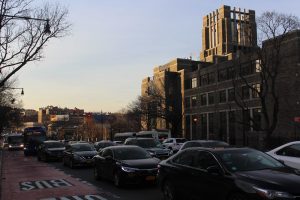By Joe Esposito

The university is trying to encourage students to engage with the community through their coursework. The Faculty Task Force on Community-Engaged Learning at Fordham released a report recommending steps to increase undergraduate participation in community-engaged learning courses.
The task force’s role is to make recommendations to the Provost regarding the structure of community-engaged learning for undergraduates.
“Community-engaged learning is any kind of learning of an experiential nature where a student advances in his or her knowledge and understanding through some form of community engagement,” said Fr. Michael McCarthy, S.J., vice president for mission integration and planning. He’s also part of the task force.
Fordham currently has community-engaged learning programs, including course-work, but these courses have not been organized on a university-wide level, according to McCarthy.
“Community-engaged learning courses are academic, unit-bearing courses that have some form of community-engaged learning as part of the course,” McCarthy.
A 2014 faculty survey found that 15.5 percent of those surveyed had taught courses of the nature before. Of those who had not, 39 percent indicated an interest in doing so. Both groups of people said they felt they did not have the knowledge and expertise to take on these types of courses.
The task force said improving these programs is a university priority.
The report discussed which courses would be regarded as community-engaged learning, as well as criteria and learning objectives for these courses. According to the report, the guidelines require a community-engaged course to include 20-30 hours of direct community engagement and to guide students toward specific learning outcomes.
The report recommends how to organize this priority as a university-wide effort, taking faculty, students and community partners into account.
The task force recommended the university adopt a structure to grow the undergraduate community-engaged learning program in the next three to five years, beginning in the 2018-2019 academic year. It plans to bring together various representatives, committees and groups which would work together to effectively enhance these programs. One such recommendation is the establishment of a center to help implement this type of learning, similar to other universities, including Jesuit ones.
Carey Kasten, associate professor of Spanish and a member of the task force, is experienced in teaching these types of courses.
“I think the question of civic engagement is important to faculty and students. I want these programs to be continued to be based on anti-racist principles and be sensitive to community needs, but I am worried that scaling up makes this more challenging.”
The report discusses faculty support, noting that they play a major role in the potential success in increasing this effort. The report noted the recruitment and training of faculty are key elements in this process.
The task force provides target goals for the future. Because the number of students that have chosen to engage in these types of courses, was lower than expected, the task force has set a goal of enrolling 10 percent of undergraduates across the three campuses in these courses. The report said it hopes to meet this goal within four years.
“The goal is to provide more students with the opportunity to engage in the local and global community in ways that really do expand their understanding of themselves as members of this community that we find ourselves in, and do that in a disciplined way that links it to what they are studying in class,” he said. “In doing so, we become much more truly the Jesuit University of New York than we are currently.”






































































































































































































